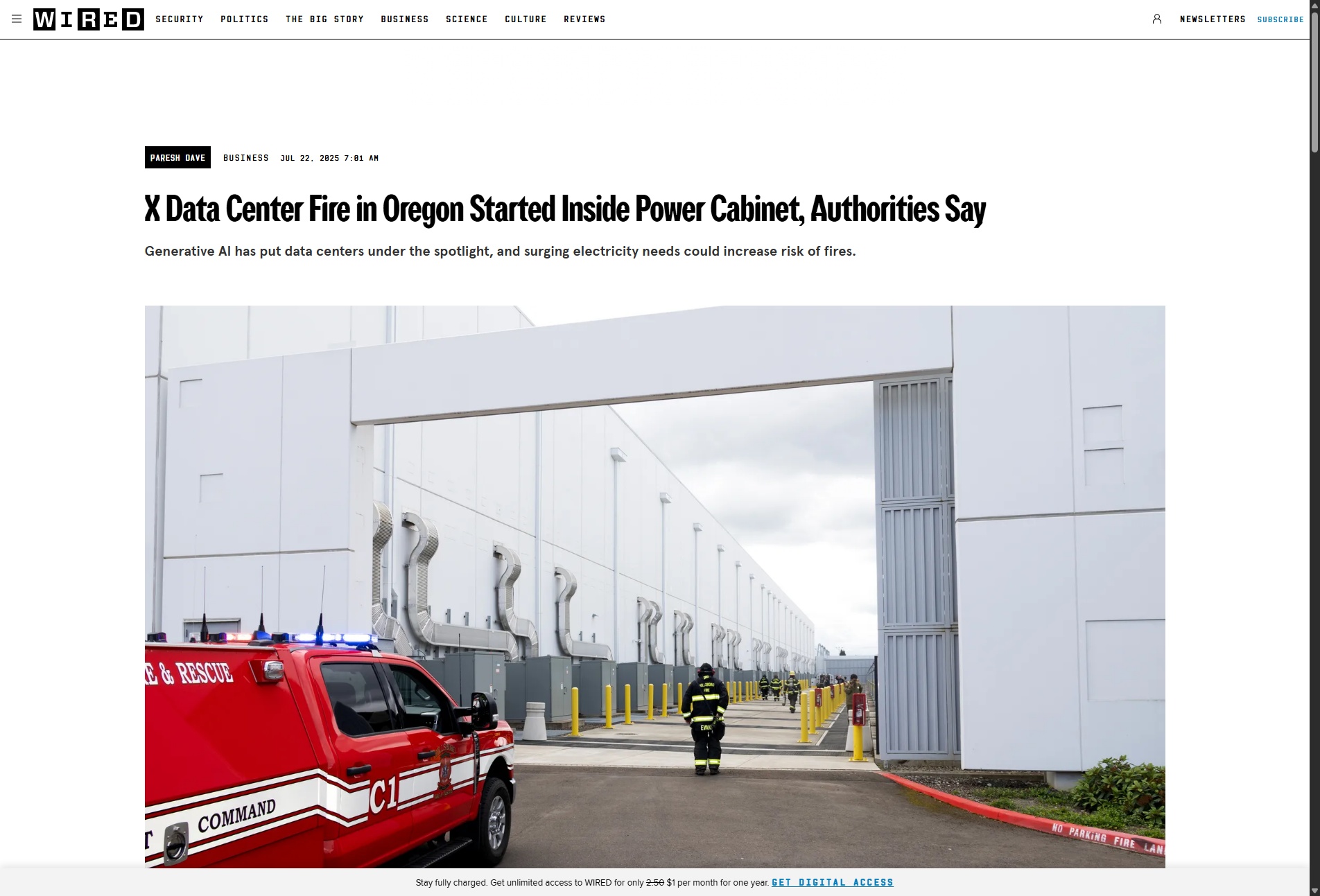Generative AI has put data centers under the spotlight, and surging electricity needs could increase risk of fires.
A recent, hours-long fire at a data center used by Elon Musk’s X may have begun after an electrical or mechanical issue in a power system, according to an official fire investigation.
WIRED was the first to report on the blaze, which occurred on May 22 in Hillsboro, Oregon. Data center giant Digital Realty operates the 13-acre site, and multiple people familiar with the matter previously told WIRED that the Musk-run social platform X has servers there.
Data center fires are rare, with about two dozen well-known incidents over the past decade across thousands of facilities globally, according to various researchers. But growing demand for generative AI technology—which relies on large clusters of advanced computers—is stretching the size and power needs of data centers. The intense load ultimately could leave AI data centers more vulnerable to fires from overheating or malfunctions.
At the X data center, firefighters initially believed a lithium-ion battery may have been involved in the fire, but that did not end up being the case, Hillsboro Fire & Rescue spokesperson Piseth Pich says.
The fire ignited a Schneider Electric Galaxy VX uninterruptible power supply (UPS) cabinet, according to a fire department report obtained by WIRED. The UPS system, which is about the size of a vending machine and is made of metal and plastic, acts as a filter and temporary battery, providing consistent electricity in case of an outage or other issues. They are common at data centers, industry experts say.
“A UPS houses large battery packs which, much like electric-vehicle batteries, can be susceptible to fires caused by electrical failures or temporary high loads,” says Shaolei Ren, an electrical and computer engineer at UC Riverside who studies data centers.
A fire department investigator was unable to visually identify a cause for ignition of the UPS cabinet, but couldn’t rule out electrical or mechanical failure of “a complex electrical system,” according to the report. The direction of the charring suggested that the fire began inside the cabinet.
Digital Realty spokesperson William Reynolds said that the company could “confirm that the fire was electrical in nature and not caused by lithium-ion batteries.” His colleague Helen Bleasdale adds that the company has shared “relevant updates with the affected customers” and “also implemented improvements to prevent recurrence.” They declined to elaborate on these statements.
Schneider Electric and xAI, which owns X, did not respond to requests for comment.
Firefighters arrived 11 minutes after the first smoke alarm, according to the fire department. Inside a second-floor power room, they encountered floor-to-ceiling smoke and doused the burning cabinet with fire extinguishers. The report lists an estimated $260,000 in losses to the data center, including total destruction of one power cabinet. Two neighboring ones suffered damage. No injuries were reported.
Russell Carroll, an electrical engineer whose California firm EMI Sleuth helps investigate fires, says inadequate cooling and temperature monitoring of power systems can lead to fires. “A cabinet with poor ventilation may have caused overheating to the batteries,” he says, while noting that photos from the scene “show a perforated panel that would provide good ventilation.”
The fire report also noted that the power cabinet included cooling fans, which are meant to help with ventilation and prevent overheating.
A similar scenario transpired in May 2023, when a fire struck Digital Realty’s data center in El Segundo, California, near Los Angeles International Airport. An El Segundo Fire Department report obtained by WIRED described a burning stack of servers and an estimated $75,000 in resulting losses. The department listed the “cause of ignition” as “failure of equipment or heat source.” Lili Sandoval, the city’s assistant clerk, says no further investigation was legally necessary.
A Digital Realty data center in Singapore caught fire last September, but local authorities have not responded to WIRED’s recent request for a copy of their investigation, and the company declined to comment on the incident. A lithium-ion battery was reportedly involved.
Ren of UC Riverside notes that data centers have every incentive to prevent fires and keep servers running. But he also expects more fires as lithium-ion batteries, despite their inherent volatility, become common inside data centers.
Increased understanding about data center fires could help limit future damage, including downtime to critical AI, health care, and emergency services. Carroll, the fire investigations expert, says it is typical for official reports to be brief and inconclusive. If insurance companies get involved, he says, more in-depth reports from outside experts will follow. But those may be kept private, and the public could be left guessing about failures of increasingly vital infrastructure.








